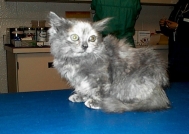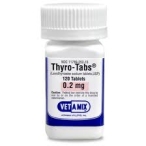Hypothyroidism is the condition where the thyroid gland does not produce enough of the thyroid hormones T3 and T4. When levels of these hormones are low, it slows metabolism.
Causes of hypothyroidism in cats
In contrast to dogs, where hypothyroidism is one of the most commonly diagnosed hormonal disorders, naturally-occurring hypothyroidism is extremely rare in cats. When it does occur, it is most common in young cats that are born with the disorder.
In older cats, hypothyroidism is usually caused as a complication of treatment for hyperthyroidism. Hypothyroidism may develop after surgically removing a thyroid tumor, destroying it with radioiodine, or by administering antithyroid drugs as a treatment for hyperthyroidism.
Clinical features seen in cats with hypothyroidism
Because deficient thyroid hormone affects the function of all organ systems, the signs of hypothyroidism vary. In cats, signs include lethargy, loss of appetite, hair loss, low body temperature, and occasionally decreased heart rate.


Obesity may develop, especially in older cats that become hypothyroid after treatment of hyperthyroidism. In cats that are born with hypothyroidism (or that develop it at a young age), signs include dwarfism, severe lethargy, mental dullness, constipation, and decreased heart rate.
Diagnosing feline hypothyroidism
To accurately diagnose hypothyroidism, one must first closely evaluate the cat’s clinical signs and routine laboratory tests to rule out other diseases that affect thyroid hormone testing.
The veterinarian must confirm the diagnosis using one more specific thyroid function tests. Like dogs with suspected hypothyroidism, these tests may include serum total T4, free T4, or TSH levels.
In some cases, a TSH stimulation test or thyroid imaging (scintigraphy) is necessary for diagnosis.
Treating cats with hypothyroidism
Hypothyroidism is easily treatable; it only requires synthetic thyroid hormone supplements (L-thyroxine or L-T4). The success of treatment can be measured by the amount of improvement in clinical signs. Your veterinarian will have to monitor the thyroid hormone level to determine whether the thyroid hormone supplement dose is correct. Once the dose has been stabilized, thyroid hormone levels are usually checked once or twice a year. Treatment is generally life-long, but the prognosis is excellent.


Źródło: animalendocrine.blogspot.com
© 2024 © Vetco 2015. Wdrożenie: Pracownia Synergii










